What Ovarian Cancer Really Means
Ovarian cancer doesn’t always scream for attention. It’s quiet. Often, it shows up with symptoms that look like bloating, indigestion, or tiredness-things most people brush off. By the time it’s diagnosed, it’s often spread beyond the ovaries. That’s why ovarian cancer awareness isn’t just important-it’s life-saving.
Every year, around 14,000 women in the U.S. and over 1,000 in Australia die from ovarian cancer. It’s the deadliest gynecological cancer. Why? Because there’s no reliable screening test like a Pap smear for cervical cancer. Doctors can’t catch it early in most cases. That means the people who care-family, friends, coworkers-need to be the first line of defense.
Know the Signs Before It’s Too Late
If you’ve heard "bloating" as the only symptom, you’ve been given half the story. Ovarian cancer rarely causes pain early on. Instead, it whispers. Here’s what to watch for, especially if they last more than two weeks and are new for you:
- Feeling full quickly, even after eating a small meal
- Unexplained weight loss or gain
- Changes in bowel habits-constipation or diarrhea that won’t go away
- Urinary urgency or frequency, with no infection
- Lower back or pelvic pain that’s persistent
- Extreme fatigue that doesn’t improve with rest
These aren’t rare. They’re common enough that many women think they’re just stress or aging. But if you’re not yourself for more than a few weeks, don’t wait. Tell your doctor. Bring a list. Ask: "Could this be ovarian cancer?"
Why Family History Matters More Than You Think
Most women who get ovarian cancer don’t have a family history. But if you do, your risk jumps. A mutation in the BRCA1 or BRCA2 gene can raise your lifetime risk from 1 in 78 to as high as 4 in 10. That’s not a small number.
And it’s not just your mother or sister. If your aunt, grandmother, or even your father’s side had breast, ovarian, pancreatic, or prostate cancer, that’s a signal. Genetic testing isn’t for everyone-but if you have a strong family pattern, talk to your doctor. A simple blood or saliva test can give you clarity.
And if you’ve had breast cancer before? Your risk for ovarian cancer goes up too. Don’t assume you’re done with cancer just because one battle is over.
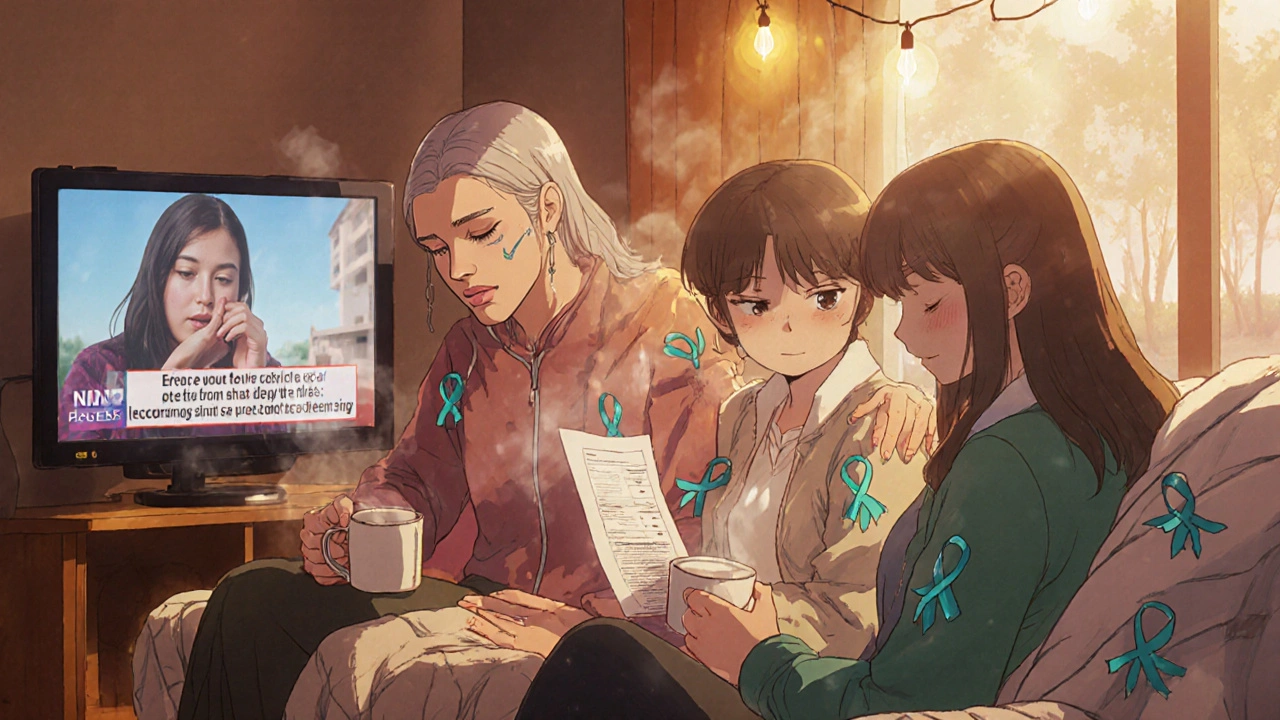
How to Help Someone Who’s Diagnosed
When someone you love gets an ovarian cancer diagnosis, the world stops. But life doesn’t. You don’t need to fix it. You just need to show up.
- Bring meals. Not just once-weekly. Chemo eats appetite. Cooking for someone is a quiet act of love.
- Drive them to appointments. Not because they can’t go alone, but because the silence in the car matters. Sometimes, they just need someone to sit with them while they cry.
- Don’t say "I know how you feel." You don’t. Say, "I’m here. What do you need today?"
- Help with kids, pets, or bills. Cancer isn’t just a medical event. It’s a financial and emotional earthquake.
And don’t disappear after the first round of chemo. Recovery takes months. The fatigue doesn’t vanish when treatment ends. Keep checking in.
How to Raise Awareness Without Saying a Word
You don’t need to host a fundraiser to make a difference. Small actions ripple.
- Wear teal. It’s the color of ovarian cancer awareness. A teal ribbon on your bag, a teal shirt on social media-it sparks questions. And that’s how conversations start.
- Share a real story. Not a celebrity’s. Not a generic post. Share what you saw. What your sister went through. What your coworker said when she was scared. Real stories stick.
- Ask your workplace to fund research. Many companies match employee donations. Just ask HR.
- Donate to groups that fund early detection research. Organizations like the Ovarian Cancer Research Alliance and Ovarian Cancer Australia aren’t just asking for money-they’re pushing for better tests.
And if you’re not sure where to start? Pick one thing. One thing you can do this week. Send a text. Buy a teal ribbon. Call your local hospital and ask if they offer free screenings or educational talks.
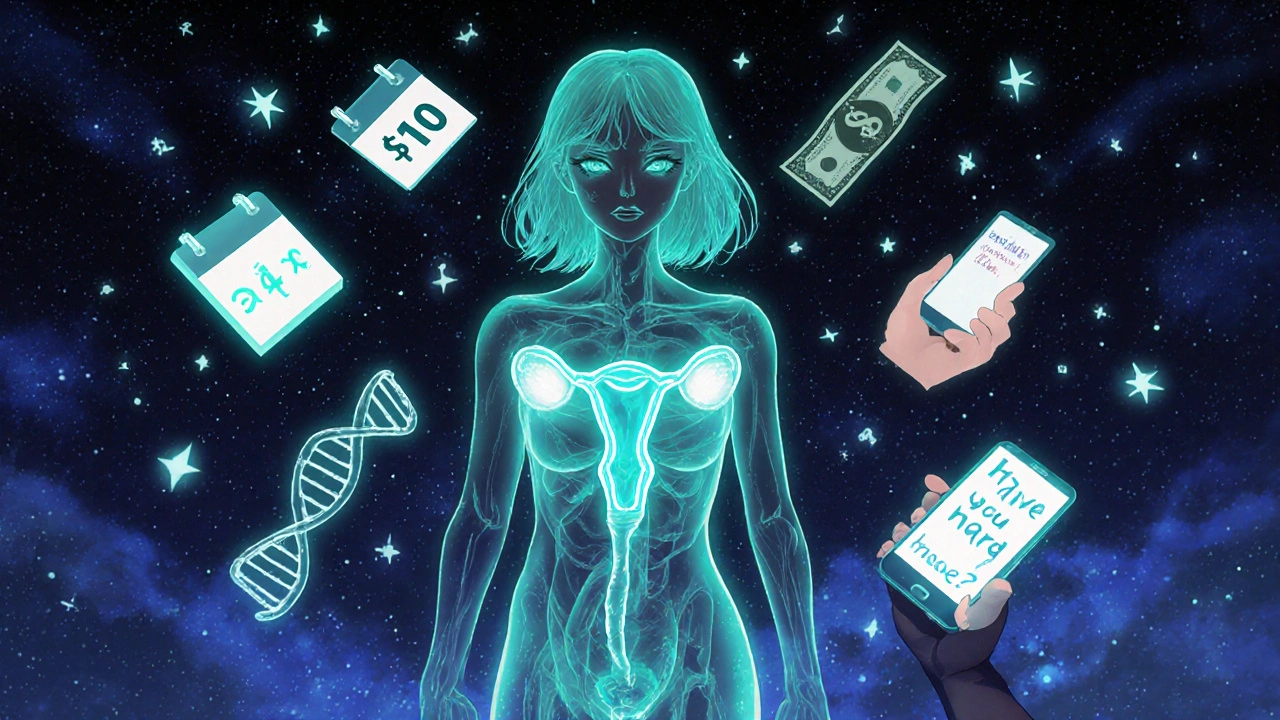
What’s Changing Right Now
There’s hope. Not because of miracle cures, but because of real progress.
Researchers are testing blood tests that can detect ovarian cancer early-before symptoms show. One trial in the UK found a new blood test spotted early-stage cancer in 80% of cases. That’s huge. Australia is joining similar trials.
Genetic counseling is now part of standard care for many women with ovarian cancer. That means families can get tested before it’s too late.
And more doctors are learning to listen. A 2024 study in the Journal of Clinical Oncology showed that when women described their symptoms clearly and doctors took them seriously, diagnosis came 3 months faster on average. That’s 3 months of extra time to fight.
What You Can Do Right Now
You don’t have to wait until next November to act. Here’s your simple, no-pressure checklist:
- Learn the 6 key symptoms. Write them down. Put them on your fridge.
- Ask your doctor if you should consider genetic testing-especially if you have a family history.
- Text a friend: "Have you heard about ovarian cancer symptoms?"
- Donate $10 to Ovarian Cancer Australia or a local support group.
- Wear teal this week. Post it. Tag someone. Say why.
These aren’t grand gestures. They’re quiet acts of courage. And in a disease that stays silent, your voice matters more than you know.
It’s Not Just About October
Ovarian Cancer Awareness Month is in October. But the work doesn’t end when the calendar turns. Every woman deserves to know her body. Every family deserves to catch it early. Every doctor deserves to listen.
This isn’t about awareness campaigns. It’s about changing how we see the quiet signs. It’s about believing women when they say something’s wrong-even if it’s just bloating.
Be the person who asks. Be the person who remembers. Be the person who doesn’t let silence win.

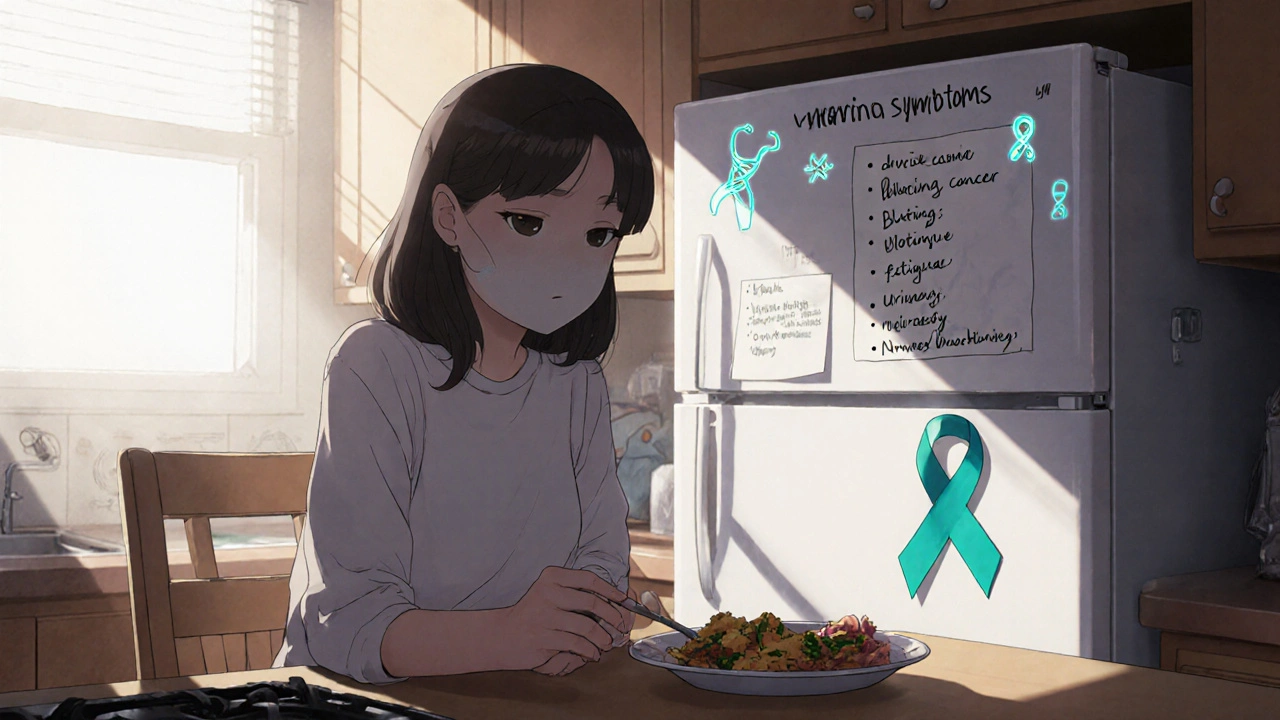
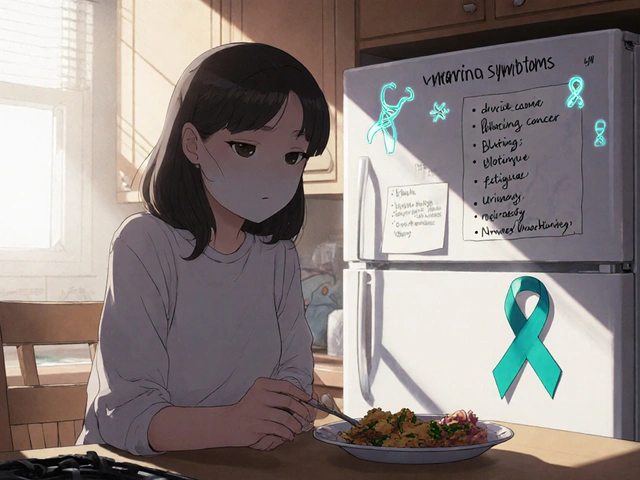
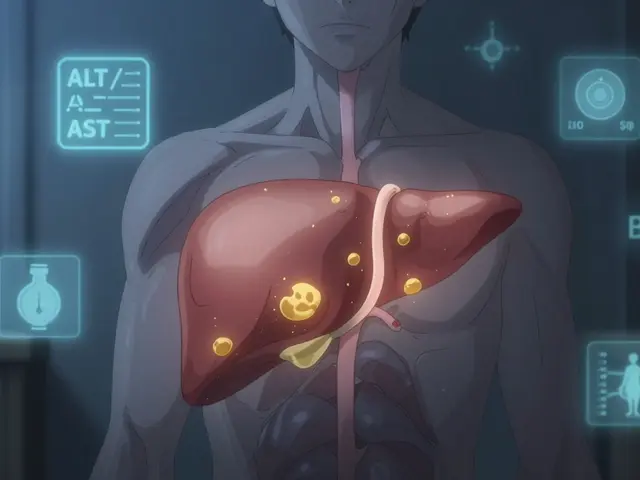

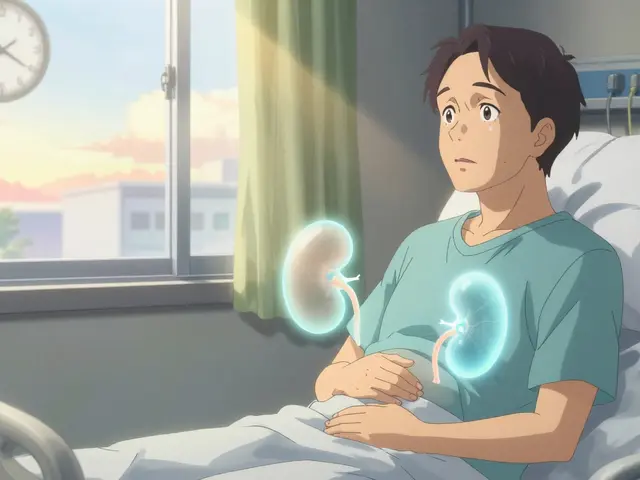

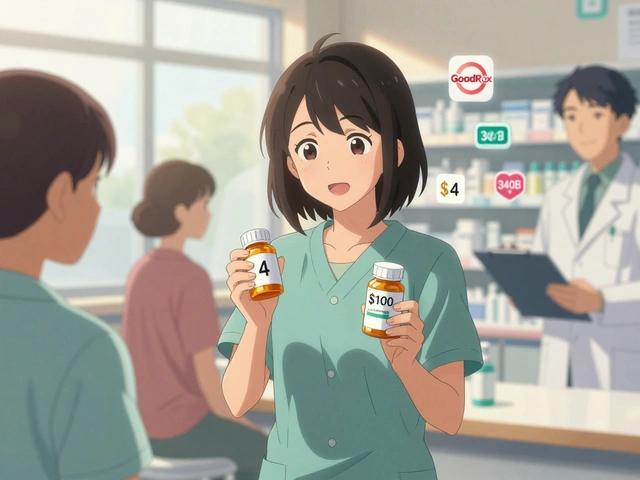
Comments
Teal ribbon on my bag today. Simple. But it worked-my coworker asked about it. We talked for 10 minutes. That’s how it starts.
I’ve had bloating for months… thought it was just stress, or maybe I’m eating too much pizza. But then I read this and got checked. Turns out, it was early-stage. Doc said if I’d waited another 3 months… I’m alive because I listened. Thanks for this.
I’m a nurse who’s seen this too many times. Women come in saying, "I just feel off." And we dismiss it as anxiety, or menopause, or "you’re just tired." But ovarian cancer doesn’t shout-it whispers. And if you don’t know what to listen for? You miss it. This list? It’s the bare minimum. Print it. Tape it to your mirror. Share it with your mom, your sister, your best friend. Seriously.
The blood test trials in the UK? That’s the real game-changer. Not some miracle drug, but a simple, scalable, low-cost screening tool that could catch it in Stage I. Imagine if this became routine-like a cholesterol check. We’re not talking sci-fi. We’re talking 2025. The tech exists. What’s missing? Funding. And political will. Stop waiting for a cure. Start demanding early detection.
Let’s be real-this is performative activism with a side of guilt-tripping. You think slapping a teal ribbon on your laptop makes you a hero? Meanwhile, real women are dying because the healthcare system is broken, underfunded, and still treats women’s pain as "emotional." You’re not saving lives-you’re curating your virtue signal. Wake up.
This is why America needs to stop outsourcing medical research to Australia and the UK. We have the best scientists, the best labs, the best funding-yet we’re letting foreign trials lead the way? The NIH should be pouring billions into ovarian cancer diagnostics, not watching from the sidelines. This isn’t charity-it’s national security. Women are the backbone of this country. Protect them.
Funny how they never mention that most ovarian cancer cases are linked to hormone replacement therapy and birth control pills. But nope-let’s just blame bad luck and forget the pharmaceutical industry that profits from late-stage chemo. The real conspiracy? They don’t want you to know prevention is cheaper than treatment.
ehhh i think its overhyped. like yeah its bad but like 14k deaths? thats less than car accidents. why are we making this a whole month? just go to the doc if you feel weird. no need for ribbons or texts or donations.
Ah, the performative empathy industrial complex. You want us to wear teal? To share? To text a friend? How quaint. Meanwhile, in the Global South, women are dying because they can’t afford a single ultrasound. This entire movement is a Western luxury-tied to Instagram aesthetics and corporate CSR campaigns. Real change requires dismantling healthcare capitalism, not posting a ribbon. But of course, you’d rather feel good than do hard things.
You say family history matters but you ignore that most cases are from environmental toxins and GMO foods. The real enemy isn’t silence-it’s the FDA and Monsanto letting chemicals into our food chain for decades. Why no mention of glyphosate? Why no mention of the fact that 80% of ovarian cancer patients lived near industrial zones? This article is a distraction. The truth is buried. And you’re helping them hide it.